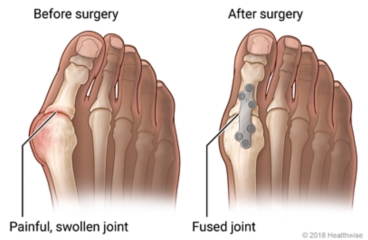
What is metatarsal phalangeal joint fusion?
The joints where the foot bones join the toes are called the metatarsal phalangeal (MTP) joints. They make up the middle part (ball) of your foot. In joint fusion surgery, the surgeon removes part of the toe joint and lets the toe bones grow together (fuse). The toes will not bend when you walk.
Fusion surgery may help relieve pain and swelling so you can walk more comfortably. It's done if other treatments for chronic pain and arthritis haven't worked.
First, your doctor will give you medicine to help you relax and to numb your foot. Or you may get medicine to put you to sleep.
Your surgeon will make one or more small cuts near your MTP joint. These cuts are called incisions. The doctor will remove small pieces of bone and cartilage. Then the doctor will position the bones together and join them with plates or screws that help the bones fuse. The plates or screws usually stay in your foot.
The surgery will leave scars that fade with time.
You will probably go home on the day of your surgery. If your surgery is more complex, you may spend the night in the hospital.
It may take 6 weeks or longer before swelling goes down and you have healed enough to return to your normal routine. You may be able to put weight on the foot right away, but follow your doctor's instructions. You may have some swelling and pain for up to 6 months.
How do you prepare for surgery?
Surgery can be stressful. This information will help you understand what you can expect. And it will help you safely prepare for surgery.
 Preparing for surgery
Preparing for surgery
- You may need to shower or bathe with a special soap the night before and the morning of your surgery. The soap contains chlorhexidine. It reduces the amount of bacteria on your skin that could cause an infection after surgery.
- Be sure you have someone to take you home. Anesthesia and pain medicine will make it unsafe for you to drive or get home on your own.
- Understand exactly what surgery is planned, along with the risks, benefits, and other options.
- Tell your doctor ALL the medicines, vitamins, supplements, and herbal remedies you take. Some may increase the risk of problems during your surgery. Your doctor will tell you if you should stop taking any of them before the surgery and how soon to do it.
- If you take a medicine that prevents blood clots, your doctor may tell you to stop taking it before your surgery. Or your doctor may tell you to keep taking it. (These medicines include aspirin and other blood thinners.) Make sure that you understand exactly what your doctor wants you to do.
- Make sure your doctor and the hospital have a copy of your advance directive. If you don't have one, you may want to prepare one. It lets others know your health care wishes. It's a good thing to have before any type of surgery or procedure.
What happens on the day of surgery?
- Follow the instructions exactly about when to stop eating and drinking. If you don't, your surgery may be canceled. If your doctor told you to take your medicines on the day of surgery, take them with only a sip of water.
- Follow your doctor's instructions about when to bathe or shower before your surgery. Do not apply lotions, perfumes, deodorants, or nail polish.
- Do not shave the surgical site yourself.
- Take off all jewelry and piercings. And take out contact lenses, if you wear them.
- Wear clothing that's easy to put on and take off. You may have a large bandage on your foot after surgery. You may also get a special type of shoe or boot to wear.
 At the hospital or surgery center
At the hospital or surgery center
- Bring a picture ID.
- The area for surgery is often marked to make sure there are no errors.
- You will be kept comfortable and safe by your anesthesia provider. The anesthesia may make you sleep. Or it may just numb the area being worked on.
- The surgery will take about an hour.
When should you call your doctor?
- You have questions or concerns.
- You don't understand how to prepare for your surgery.
- You become ill before the surgery (such as fever, flu, or a cold).
- You need to reschedule or have changed your mind about having the surgery.
Where can you learn more?
Go to http://www.healthwise.net/patientEd
Enter M150 in the search box to learn more about "Metatarsal Phalangeal Joint Fusion: Before Your Surgery".
Current as of: July 24, 2025
Author: Ignite Healthwise, LLC Staff
Clinical Review Board
All Ignite Healthwise, LLC education is reviewed by a team that includes physicians, nurses, advanced practitioners, registered dieticians, and other healthcare professionals.

